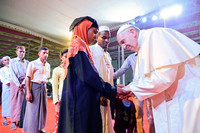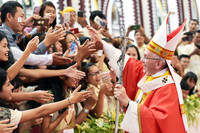

Well aware he was disappointing some people by not using the word “Rohingya” publicly in Myanmar, Pope Francis said his chief concern had been to get a point across, and he did.
“If I would have used the word, the door would have closed,” he told reporters Dec. 2 during his flight from Dhaka, Bangladesh, to Rome.
He spent almost an hour answering reporters’ questions after his six-day trip to Myanmar and Bangladesh.
In his speeches in Myanmar, Pope Francis repeatedly referred to the obligation to defend the lives and human rights of all people. But he did not specifically mention the Rohingya, a Muslim minority from Rakhine state. The Myanmar military, claiming it is cracking down on militants, has been accused of a massive persecution of the Rohingya to the point that some describe it as “ethnic cleansing.”
More than 620,000 Rohingya have fled across the Bangladeshi border just since August, joining hundreds of thousands already living in refugee camps there.
For the government of Myanmar, the Rohingya do not exist; they are considered undocumented immigrants.
“I knew that if, in an official speech, I would have used the word, they would close the door in my face,” the pope told reporters who asked why he did not name the group.
However, “I described the situation” publicly, knowing “I could go further in the private meetings” with government officials.
“I was very, very satisfied with the meetings,” the pope said. “I dared to say everything I wanted to say.”
Finally being able to meet some of the Rohingya refugees Dec. 1 in Bangladesh was an emotional moment.
Arrangements were made for 16 refugees to travel to Dhaka from Cox’s Bazar, where the huge refugee camps are, so they could join the pope and Bangladeshi religious leaders for a meeting devoted to peace.
The refugees had traveled so far and been through so much that Pope Francis said he could not just let them shake his hand and be whisked away, as some event organizers seemed to think was proper.
“And there I got upset. I yelled a bit. I’m a sinner,” he said.
He had a few minutes with each of them, listening to their stories with the help of an interpreter, holding their hands and looking into their eyes.
“I was crying, but tried to hide it,” the pope told reporters. “They were crying, too.”
Listening to them was emotional, he said, and “I couldn’t let them leave without saying something” to them. So he asked for a microphone and spoke about their God-given dignity and the obligation believers of all faiths have to stand up for them as brothers and sisters. He also apologized for all they had suffered.
Pope Francis refused to give reporters details about his private meetings with government officials and military leaders in Myanmar, but insisted they were marked by “civilized dialogue” and he was able to make the points important to him.
The pope was asked what he thought of recent criticism by human rights groups of Aung San Suu Kyi, the Nobel Peace Prize laureate and de facto leader of Myanmar’s civilian government, over her handling of the Rohingya crisis. Pope Francis responded that people must take into account the challenges that are part of Myanmar’s transition from military rule to democracy.
Myanmar is at a “turning point” where it will be difficult to move forward, he said, but it also would be difficult to back away from change.
And, he said, “I never lose hope.”
The political implications of his Nov. 27-30 stay in Myanmar and his Nov. 30-Dec. 2 stop in Bangladesh grabbed the headlines mainly because of the situation of the Rohingya people.
The political and pastoral sides of his trip were interwoven.
Meeting Rohingya refugees at the end of an interreligious gathering in Dhaka, Bangladesh, Dec. 1, Pope Francis said, “Today, the presence of God is also called ‘Rohingya,’” after listening to each of the 16 refugees briefly tell their stories.
“They, too, are images of the living God,” Pope Francis told Christian, Muslim, Buddhist and Hindu leaders. “Let’s not close our hearts. Let’s not look away.”
The Catholic communities in both Myanmar and Bangladesh are very small; Catholics make up slightly more than 1 percent of the population in Myanmar and only a quarter of 1 percent of the population in Bangladesh. In both countries, the influence of the Church is disproportionately large because of the contributions of Catholic schools, hospitals and other activities.
In Myanmar, the majority of people are Buddhist, and in Bangladesh, the majority are Muslim.
On the return flight to Rome, Pope Francis was asked about how a Catholic should balance a commitment to interreligious dialogue and a commitment to evangelization with the hope of welcoming converts into the Church.
The key, the pope said, always is witness. It is not a Christian’s job to try to persuade someone to become Christian. That is the Holy Spirit’s job, he said, but individuals must prepare the way by offering a living witness of what it means to be Christian.
The pope met privately with a varied group of religious leaders in Myanmar before holding a formal meeting with leaders of the nation’s Buddhist community Nov. 29.
Pope Francis also held separate meetings in both countries with the nation’s bishops. In Myanmar, he told the bishops that the idea that differences are a threat to peaceful coexistence is an example of an “ideological colonization” sweeping the world and trying to make everyone the same.
“The unity we share and celebrate is born of diversity,” he said. Unity in the Church and in a nation “values people’s differences as a source of mutual enrichment and growth.”
As Myanmar continues its transition to democratic rule and tries to deal with the challenges of development and full equality for all its ethnic groups, Pope Francis told the bishops to ensure that their voices are heard, “particularly by insisting on respect for the dignity and rights of all, especially the poorest and most vulnerable.”
Before leaving the country, he celebrated Mass Nov. 30 with thousands of young people from throughout Myanmar. He told them to be messengers of the Good News of God’s love and mercy.
“As messengers of this good news, you are ready to bring a word of hope to the Church, to your own country, and to the wider world,” he said. “You are ready to bring good news to your suffering brothers and sisters who need your prayers and your solidarity, but also your enthusiasm for human rights, for justice and for the growth of that love and peace which Jesus brings.”
Witness was also the theme he highlighted at a large Mass in a park in Yangon, Myanmar’s capital.
Pope Francis prayed that Catholics in Myanmar would “be faithful witnesses of the reconciliation and peace that God wants to reign in every human heart and in every community.”
In Bangladesh, his only public Mass was celebrated Dec. 1 and included the ordination of 16 priests, who came from different dioceses and religious orders. He read the prescribed homily from the rite of ordination, but then spoke off the cuff to thank the thousands of people who had traveled far for the Mass. He encouraged them to pray for their priests.
The next day, before leaving Bangladesh, he met with priests, religious and seminarians at Holy Rosary Church in Dhaka. He told them the harmony, mutual respect and peace that should reign in relations between members of different religions must first be found between members of the Catholic Church. —CNS